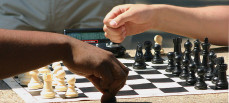Recently, as a lonely American at a friend’s birthday party in Montreal, I found myself the object of pointed conversation: “How do you feel about focus shifting away from the U.S. and back to Canada for moral leadership?” As I informed my Canadian friends, the pending shift is not only … <Read More>
Deflategate: Best Route to the U.S. Supreme Court
Conventional wisdom has Deflategate ending as of today, with the 2nd Circuit Court rejecting an appeal and the U.S. Supreme Court highly unlikely to hear the case. If only the Players’ Association would accurately characterize the NFL’s entire Deflategate investigation for what it was: biased and fraudulent, they might then … <Read More>
Four Strikes: Draymond Green’s Four Game Suspension
So Draymond Green has been suspended for tonight’s game in the NBA finals because he swiped Lebron James in the groin. Reasonable minds can differ whether Lebron provoked that unsportsmanlike conduct by straddling and stepping over Green after knocking him to the ground rather than stepping around him. Nearly everybody … <Read More>
DeflateGate: The Smoking Gun
THE CROOKED CASE AGAINST TOM BRADY: WHAT’S WRONG WITH THIS PICTURE?
The NFL insists that science alone cannot explain the Patriots’ pressure drop.
Therefore the ball attendant must have deflated them — and quarterback Tom Brady must have known.
Much depends on which gauge the referee actually used to measure … <Read More>
An Aristocracy Anyone?
So the U.S. Supreme Court decides that individuals can give any amount they want to any candidate they want. Critics decry corruption. But a more benevolent take would have us moving consciously toward an Aristocracy — a rule by the few for the sake of all.
If the rich and … <Read More>
American Hustle: Appearance & Reality
American Hustle opens, with a classic scene of Irving affixing a hairpiece to his bald scalp and then constructing an elaborate comb over. We sense from the opening we are in the presence of someone who makes a great effort carefully to construct a false appearance. We are not who … <Read More>
American Hustle: Entrapment
Where to start? I guess at the beginning, in the Garden of Eden, where the snake, an agent of the Sovereign, convinces Eve to violate the Law and eat the apple in order to appreciate and enjoy a life that the Sovereign had prohibited. So Eve plucked the apple, passed … <Read More>
American Hustle
If you haven’t yet seen American Hustle but you intend to, either before or after the Academy Awards this coming Sunday, do not read this series of posts — yet. They may well ruin this movie for you. On the other hand, if you have seen it once, or think … <Read More>
Iran: Staying in the Middle Game
Should we negotiate a partial deal with Iran now?
Apparently the Obama administration and Iran have come to a meeting of the minds whereby Iran will, for the moment halt further development of nuclear capacity and the U.S. with Europe will for the moment suspend some sanctions. The Israelis and … <Read More>
In a Word
That’s what the NY Times account quotes Secretary of State John Kerry as assuring the Egyptian leaders about the Obama administration’s decision to suspend the delivery of major weapons systems to this troubled country. No, not a punishment for deposing, and arresting the Islamist president. Not a punishment for putting … <Read More>



